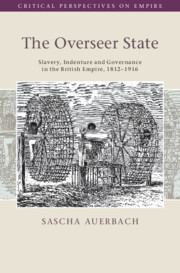186 results
6 - “They Must Know Their Master, and He Must Know Them”
-
- Book:
- The Overseer State
- Published online:
- 21 March 2025
- Print publication:
- 27 March 2025, pp 237-280
-
- Chapter
- Export citation

The Overseer State
- Slavery, Indenture and Governance in the British Empire, 1812–1916
-
- Published online:
- 21 March 2025
- Print publication:
- 27 March 2025
10 - Picturing Power
-
-
- Book:
- Cold War Asia
- Published online:
- 30 January 2025
- Print publication:
- 06 February 2025, pp 210-233
-
- Chapter
- Export citation
9 - A History of Sweatshops, 1780–2019
-
- Book:
- Out of Poverty
- Published online:
- 02 January 2025
- Print publication:
- 09 January 2025, pp 138-155
-
- Chapter
- Export citation
Rajaratnam in London: Writing, race, and capital in Singapore’s intellectual history
-
- Journal:
- Modern Asian Studies , First View
- Published online by Cambridge University Press:
- 16 December 2024, pp. 1-26
-
- Article
-
- You have access
- HTML
- Export citation
5 - Debating Language Policies
-
- Book:
- Language Policy in Action
- Published online:
- 05 December 2024
- Print publication:
- 12 December 2024, pp 83-106
-
- Chapter
- Export citation
14 - A Corpus-Based Multidimensional Analysis of EMI University Classroom Discourse
- from Part II - Empirical Chapters (Case Studies)
-
-
- Book:
- Researching English Medium Instruction
- Published online:
- 14 December 2024
- Print publication:
- 05 December 2024, pp 240-259
-
- Chapter
- Export citation
9 - Indonesia
-
-
- Book:
- States and their Nationals Abroad
- Published online:
- 04 December 2024
- Print publication:
- 05 December 2024, pp 204-229
-
- Chapter
- Export citation
Conclusion
-
- Book:
- The Port
- Published online:
- 21 November 2024
- Print publication:
- 28 November 2024, pp 276-290
-
- Chapter
- Export citation
4 - Regional Responses to the Vietnamese Invasion
-
- Book:
- The Third Indochina War
- Published online:
- 07 November 2024
- Print publication:
- 21 November 2024, pp 90-109
-
- Chapter
- Export citation
Georeferencing Sunda pangolin Manis javanica records in Singapore
-
- Journal:
- Oryx , First View
- Published online by Cambridge University Press:
- 16 September 2024, pp. 1-4
-
- Article
-
- You have access
- Open access
- HTML
- Export citation
13 - Australia’s engagement with ASEAN
- from Part III - Regional issues
-
-
- Book:
- Australia in World Affairs 2016–2020
- Published online:
- 25 October 2024
- Print publication:
- 13 June 2024, pp 174-187
-
- Chapter
- Export citation
12 - Australia and the Four Asian Dragons: Beyond the Economic Agenda?
-
-
- Book:
- Australia in World Affairs 1991–1995
- Published online:
- 04 May 2024, pp 138-149
-
- Chapter
- Export citation
8 - Confucian Constitutional Identity
- from Part II - Comparative Perspectives
-
-
- Book:
- Deciphering the Genome of Constitutionalism
- Published online:
- 14 March 2024
- Print publication:
- 21 March 2024, pp 101-112
-
- Chapter
- Export citation
Norm Entrepreneurship in Digital Trade: The Singapore-led Wave of Digital Trade Agreements
-
- Journal:
- World Trade Review / Volume 23 / Issue 2 / May 2024
- Published online by Cambridge University Press:
- 20 March 2024, pp. 208-241
- Print publication:
- May 2024
-
- Article
-
- You have access
- Open access
- HTML
- Export citation
36 - Comparative Legal Education
- from Part IV - Comparative Law beyond the State
-
-
- Book:
- The Cambridge Handbook of Comparative Law
- Published online:
- 26 January 2024
- Print publication:
- 01 February 2024, pp 713-734
-
- Chapter
- Export citation
Shape-shifting and Strategic In/visibility: Comparing Sex Work Activism in Singapore and the Philippines
-
- Journal:
- TRaNS: Trans-Regional and -National Studies of Southeast Asia / Volume 12 / Issue 1 / May 2024
- Published online by Cambridge University Press:
- 10 January 2024, pp. 27-44
-
- Article
-
- You have access
- Open access
- HTML
- Export citation
14 - Sustainability education in early childhood education contexts
- from Part 2
-
-
- Book:
- Young Children and the Environment
- Published online:
- 05 January 2024
- Print publication:
- 05 January 2024, pp 295-317
-
- Chapter
- Export citation
Chapter 8 - Confabulation as Decolonial Pedagogy in Singapore Literature
- from Part II - Methodologies
-
-
- Book:
- Decolonizing the English Literary Curriculum
- Published online:
- 02 November 2023
- Print publication:
- 09 November 2023, pp 167-184
-
- Chapter
-
- You have access
- Open access
- HTML
- Export citation
The ‘fintech revolution’ is here! The disruptive impact of fintech on retail financial practices
-
- Journal:
- Finance and Society / Volume 8 / Issue 2 / 2022
- Published online by Cambridge University Press:
- 09 November 2023, pp. 129-148
-
- Article
-
- You have access
- Open access
- Export citation


